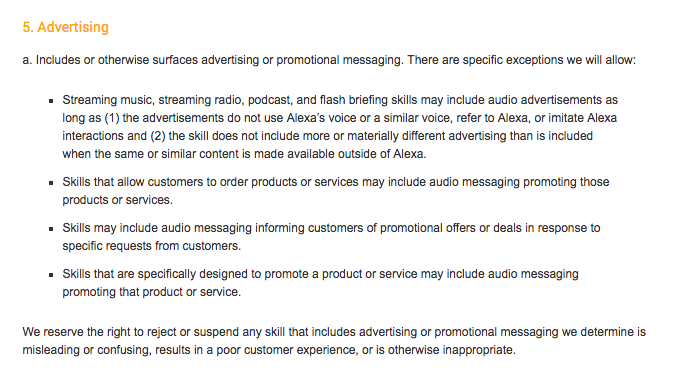VoiceLabs suspends Alexa audio ads, saying ‘market not ready’
Amazon's ad restrictions raise questions about Alexa skills monetization.

In May, voice analytics company VoiceLabs introduced audio ads (“sponsored messages”) for Alexa to help developers make money off their “skills.” Now the company has suspended that program:
We are very proud that we delivered millions of Audio Ads on the Alexa service that were accepted by consumers. There were a few consumers unhappy with the advertising, but statistically, consumers accepted the ads and kept using the Alexa skills at the same rate, and developers were elated to finally have a real revenue stream.
We paid out thousands of dollars to developers, and they were invigorated to invest more in their Alexa skills. The May 21st Policy change by Amazon really drove home that the market is not ready.
VoiceLabs CEO Adam Marchick said that the interactive format saw an extremely high degree of acceptance. However, Amazon is being very restrictive about advertising on Alexa devices. In his post announcing the suspension of the program, Marchick referenced the Amazon advertising policy change published May 21.
The change clarified but generally codified restrictions around ads on Alexa. The policy says developer skills will be rejected if they include “promotional messaging,” with a few exceptions: “streaming music, streaming radio, podcast, and flash briefing skills; skills that allow customers to order products or services may include audio messaging promoting those products or services.”

In view of this, arguably skills with VoiceLab’s sponsored messages would been rejected. VoiceLabs had been working with a number of brands but said it had also seen considerable demand from CPG companies in a shopping context. Arguably those types of messages would be allowed under the second bullet above.
Google has done some experimentation with promotional messaging on its virtual assistant, Google Home. However, the company is currently making indirect revenue from Home on transactions and shopping-related fees. Google may favor a transaction-fees model for revenue rather than seeking to develop Home as an audio advertising platform, as many would expect.
Apple HomePod is also likely to be a mostly ad-free smart speaker/assistant. It’s more likely the company will pitch HomePod as an extension of its larger app distribution network for developers.
Regardless, the Amazon clampdown and the VoiceLabs retreat suggest it may be a long time before consumers find many traditional ads on their smart assistants. The Echo Show, with its built-in screen, may be a different matter altogether.
Contributing authors are invited to create content for MarTech and are chosen for their expertise and contribution to the search community. Our contributors work under the oversight of the editorial staff and contributions are checked for quality and relevance to our readers. MarTech is owned by Semrush. Contributor was not asked to make any direct or indirect mentions of Semrush. The opinions they express are their own.
Related stories
New on MarTech